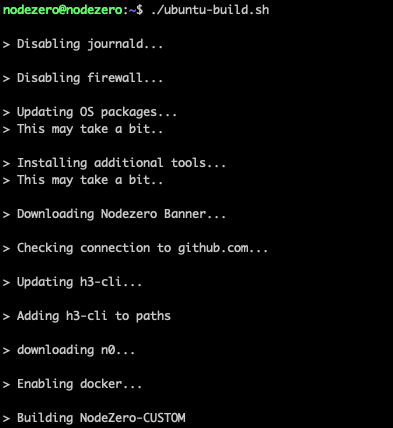Ubuntu Setup Script
Setup Ubuntu for Running NodeZero
OVA is preferred
We highly recommend using our OVA for NodeZero installation, as it is the preferred method to ensure a seamless setup.
If deploying the Nodezero OVA is not a viable option for your infrastructure, Horizon3.ai provides a script to help setup a base Ubuntu 20.04 LTS OS for use with Nodezero.
Minimum Specifications
The NodeZero host requires a minimum configuration of:
- 2 x CPUs
- 8GB of RAM
- 40GB of disk
- Bridged network adapter
Before Setting Up
If your environment restricts access to external sites through an outbound proxy or similar mechanism, please make sure that it allows connections to the following sites:
*.ubuntu.com*.canonical.comdownloads.horizon3ai.comgithub.com(optional forh3-cliupdates)
Downloads
Tip
Always verify the files download come from Horizon3.
NodeZero Ubuntu Setup Script
Running the Script
Download the script onto the host that is going to be running NodeZero. Next set the script to be executable and run the script. After running the script it can be removed.
curl -o ubuntu-build.sh https://downloads.horizon3ai.com/utilities/ubuntu-build.sh
sudo chmod +x ubuntu-build.sh
./ubuntu-build.sh
sudo rm -f ubuntu-build.sh
What the Script Does
This script sets up ubuntu with the required libraries for NodeZero to run successfully on the host machine. It sets the MOTD letting users that login know they are logging into a NodeZero host and it installs 2 utilities (h3-cli and n0)
h3-cli allows for communication and management of NodeZero on the host.
n0 utility enables management of the NodeZero hosts settings.
This script does the following:
-
Disables Journald
-
Disables the firewall (ufw)
-
Updates the OS
-
Installs the following libraries:
-
cloud-init
-
open-vm-tools
-
docker.io
-
nmap
-
tcpdump
-
dnsutils
-
unzip
-
jq
-
telnet
-
-
Sets up Message of the Day (MOTD)
-
downloads h3-cli
-
downloads n0 utility
-
Add current user to docker group
A successful run of the script looks like
